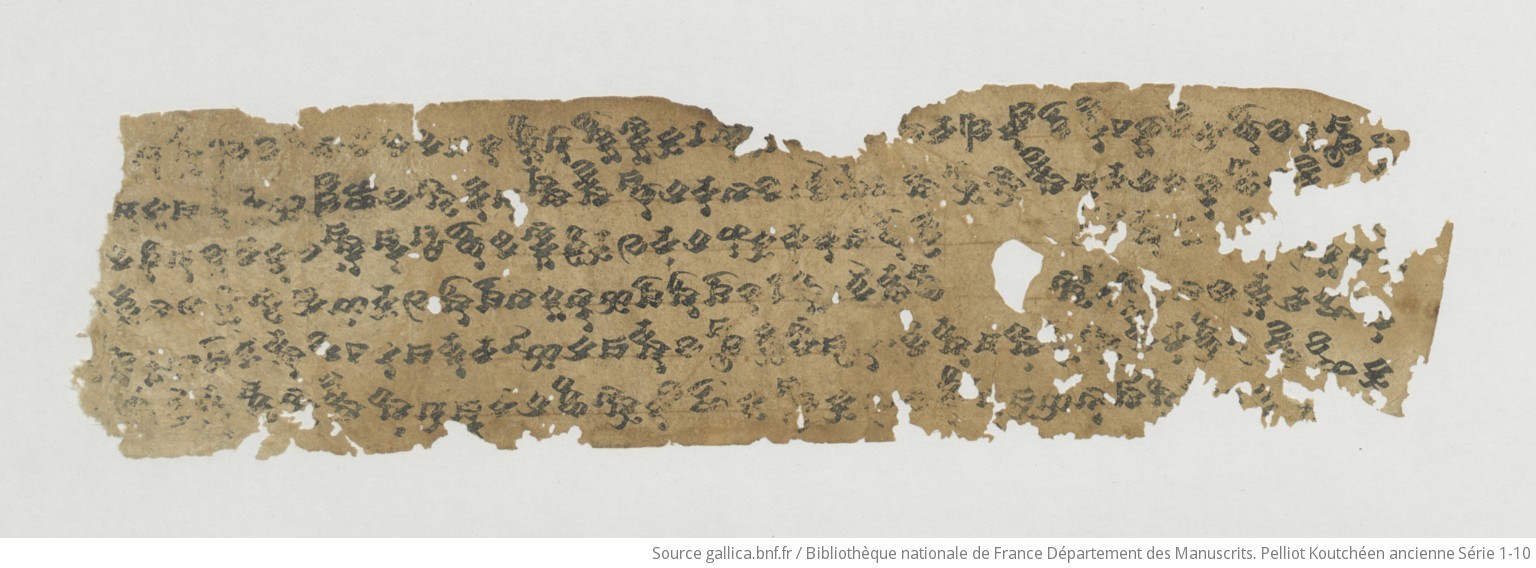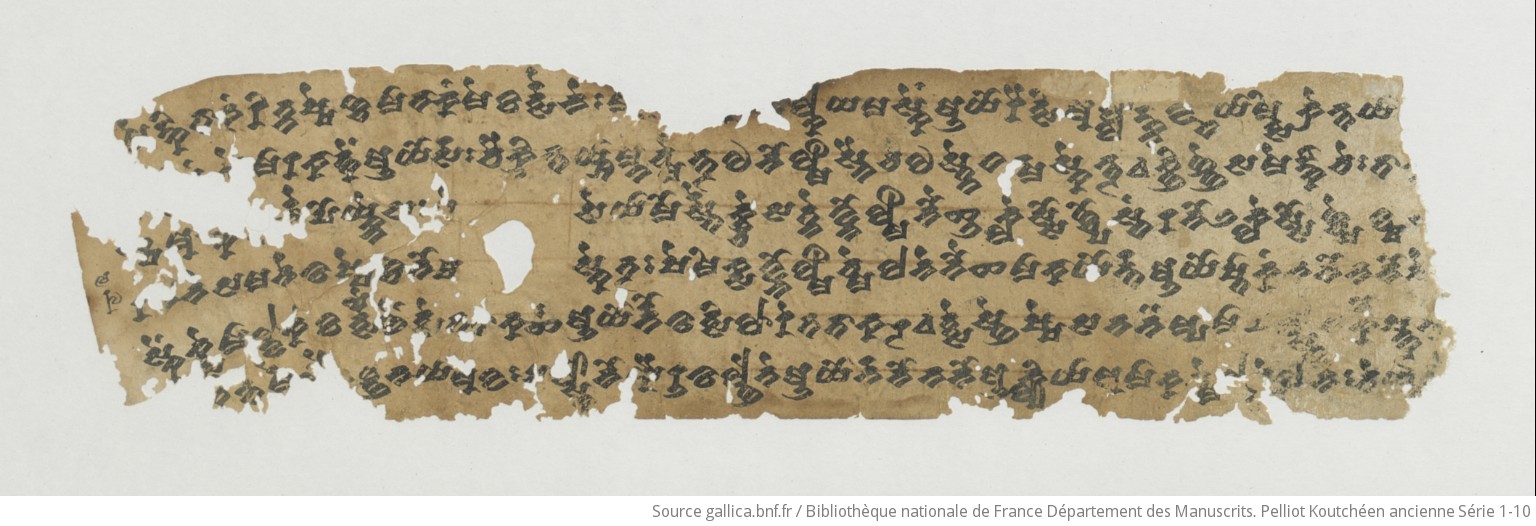PK AS 7E
| Known as: | PK AS 7E; Pelliot Koutchéen Ancienne Série 7E; K 5 |
|---|---|
| Cite this page as: | Georges-Jean Pinault; Melanie Malzahn (collaborator); Michaël Peyrot (collaborator). "PK AS 7E". In A Comprehensive Edition of Tocharian Manuscripts (CEToM). Created and maintained by Melanie Malzahn, Martin Braun, Hannes A. Fellner, and Bernhard Koller. https://cetom.univie.ac.at/?m-pkas7e (accessed 05 Jul. 2025). |
Edition | |
| Editor: | Georges-Jean Pinault; Melanie Malzahn (collaborator); Michaël Peyrot (collaborator) |
| Date of online publication: | 2012-02 |
Provenience | |
| Main find spot: | Duldur-akur |
| Expedition code: | 496 |
| Collection: | Bibliothèque nationale de France, fonds Pelliot Koutchéen (Paris) |
Language and Script | |
| Language: | TB |
| Linguistic stage: | classical |
| Script: | classical |
Text contents | |
| Title of the work: | Karmavibhaṅga |
| Text genre: | Literary |
| Text subgenre: | Doctrine |
| Verse/Prose: | verse |
| Meter: | 554443 (4x) |
Object | |
| Manuscript: | Karmavibhaṅga β |
| Material: | ink on paper |
| Form: | Poṭhī |
| Size (h × w): | 8.2 × 31.3 cm |
| Number of lines: | 6 |
| Interline spacing: | 1.3 cm |
Images
Images from gallica.bnf.fr by courtesy of the Bibliothèque nationale de France, Département des Manuscrits, Pelliot koutchéen.
Transliteration
| lf | 30 5 |
|---|---|
| a1 | (– – –) [nt](·) (– –) sk(·)[ṃ] (–) sū se yā mo r[s](·)[e] kuce sa o no lme n[au] s̝la kle sso ñcta tā ka rme(·) po staṃ skwa ss(·) ñcma [s]ke ntra [4] /// |
| a2 | – – nau s̝a¯ ¯k skwa [ss]o ñctā kaṃ skwa sso (–) [o] staṃ ma ske ntra : ṣe mi ksa wno lmi ai ske ma nā yo¯ ¯r ka tke ma ne e ṅka ske ntra ā yo rai ly(·)e (·)e – – /// |
| a3 | s(·)ṃ s̝pa kā tkeṃ tu sa (·)[ā] o [nm]i sso ○ ñcma ske ntra : snai ru we ā stre ā yo rse tai sa ā stre o ko yä nmā tsi śco tu sa wno [l] /// |
| a4 | [m](·)(·) ś(·) teṃ o(·) (·)ne (–) nma ske(·) [tra] (–) ○ kñi ññe sa ke ke no¯ ¯s̝ : tā kaṃ o ro cci ktsai tsa ññe śma nme tsmeṃ ta rne ka wai pe cce nta /// |
| a5 | (– –) (·)kw(·) (–) ñcpa rwe ta tā ka rmeṃ skwa sso ñcpo staṃ ma ske ntra : tū sa ke tā ñme skwa ssu ṣe kne ssi ai s̝s̝a llā yo rka t[k]e ma ne ṣe /// |
| a6 | wno lmi mai wa ññe sā kwa rñai e ntwe kla kle lya kā ñ (– – – – –) o tse ra no ktsai tsñai pre ścyai ne ma nta nta kca sa¯ ¯k ka l[pā] [skeṃ] [ṣe] /// |
| b1 | me ṅki tā kaṃ ri tta ṣṣe ñca mā tā kaṃ me ka rtse ne : m(·) (– – – – –) lk(·) ya ma skeṃ ā yo rai tsi a ll[o] ṅkna wa¯ ¯t yā mtsi kre nta yā (– –) /// |
| b2 | – ··ṃ ·e (–) mā ra kā tkeṃ ā yo rsa : cai krui nta yśā mna cme ntra o no lmi snai ce o stne ta nma ske ntra e kñi ññe sa me ṅkī ce : tā [k](·) /// |
| b3 | [s̝]pa mu [s]k(·) (–) r(·)e po ykne sa se ○ se yā mo rste kuce sa tne wno lmi nau¯ ¯s̝ la kle sso ñcpo staṃ ra no la kle sso ñcṣe kma [s](·)(·) /// |
| b4 | ra n(·) ne sa ma ne ai ṣṣe ñca no ma ○ ske tra : ṣe mi ksa wno lmi cme la ne nau s̝a mā kā yo rnta ā yo ṣtā kaṃ na no na no [t]e /// |
| b5 | skeṃ ke mā lwā ke ka rtsau ñeṃ tse ta tā ka¯ ¯s̝ : ā yo rno ai tsi lā re ta tā ka¯ ¯r e ntse sñe ṣṣe sa na nä mpa mā [pa] ls[ko] [ta] rko ṣwra nta (–) /// |
| b6 | – – ta nta rme lau (–) ñña na yā mu wa : pa lsko no yai ru ai lñe ne ā yo rna no na no ā klyi yā mu mā ka cme la cme la ne : ce y[na] – – – /// |
Transcription
| lf | 30-5 |
Translation
| a1 | They o(btain possessions). [4c] That is the deed through which beings after having been suffering first become happy afterwards. [4d] |
|---|---|
| a1+ | (But what is the deed through which beings), if they are happy first indeed, become happy afterwards? [5a] |
| a2 | Some beings while giving a gift hold on to it being joyful, ... the giving of gift ... [5b] |
| a2+ | And (after)wards they rejoice because of it |
| a3 | [and] they do not become remorseful. [5c] Stainless [and] pure [is] this gift, so pure to obtain a fruit [from it], (and) the beings (rejoice) because of it. [5d] |
| a3+ | (Among) humans they are reborn in a rich house provided with possession. [6a] |
| a4 | [When] they become adults [and] old age comes to them, the richness (pl.) will surely increase for it [= old age]. [6b] |
| a4+ | ... (That is the deed through which) beings after having been happy before, become happy afterwards. [6c] |
| a5 | Therefore the one whose wish [is] to be always happy, should give gifts [while] always being joyful ... [6d] |
| a5+ | (But which is the deed through which) the beings (are) facing suffering starting from youth onwards indeed, [7a] [and] even further in the time of old age never obtain any happiness at all [and] (are) always (full of suffering?) [7b] |
| a6+ | (That is the deed done by beings who) are lacking the (good friend gift) [and] for which there is no one connecting them to the good. [7c] They do not make (eff)orts to give gifts or to do other good deeds. [7d] |
| b1 | [7d] |
| b1+ | ... also they do not rejoice because of the gift. [8a] |
| b2 | When these beings are reborn somehow among humans, they are reborn in a poor house lacking possession. [8b] |
| b2+ | ... and ... they [= the possessions?] disappear for them in every way. [8c] |
| b3 | This is the very deed through which the beings here, first full of suffering afterwards also always become full of suffering. [8d] |
| b3+ | (But what is the deed through which a being) even while being poor then become a donor? [9a] |
| b4 | Some beings [if] they have been giving many gifts in former births, being reborn again and again, [9b] ... they give to everyone who is not a receptacle of virtue. [9c] |
| b5 | Then the gift giving is something that became dear [to them]. [Even faced] with the enemy avarice, they will not abandon their intention after having promoted it. [9d] |
| b5+ | ... for them (the deeds) having been done in the past, [10a] but the mind has been trained in gift giving [and] again and again instructed many times birth after birth. [10b] |
| b6 | They ... |
Other
| a2 | (But what is the deed through which beings), if they are happy first, become happy afterwards [too]? (cf 20) (Peyrot 2013b: 327) |
|---|---|
| a4 | If they are important [lit. great] and old age comes upon them, their possessions will grow ... (cf 21) (Peyrot 2013b: 686) |
| b2 | If these beings are ever [re]born among humans, they are born in a poor house that lacks possessions. (cf 23) (Peyrot 2013b: 313) |
| b3 | That is the deed through which beings here, sorrowful before, become always sorrowful afterwards too. (cf 23) (Peyrot 2013b: 327) |
| b4 | Some beings, if they have been giving many gifts in former births, [are] born again and again. (cf 23) (Peyrot 2013b: 714) |
Commentary
Linguistic commentary
| Just as in the other fragments of this manuscript, we have instances of preservation of final -ä in colon-final position either written as archaic -ä or o-mobile. We also have other archaic spellings again: pärwe (a5), wräntär (b5). | |
| n1 | ruwe is a hapax, the meaning of which is approximately ‘stain, impurity’. |
| n3 | ktsaitsñai is the oblique singular fem. of an adjective epithet of preścyai ‘time, epoch’; it then belongs to an adjective of appurtenance ktsaitstsäññe, formally identical to the abstract. |
| n4 | The iterated demonstrative pronoun se se certainly has emphatic value. |
Parallel texts
| THT 521; Mahākarmavibhaṅga §§ 35-36, 38 (Lévi 1932: 68-71, 134-136) |
Philological commentary
| The meter is 4 x 25 (5/5/8/7). | |
| n2 | The spelling tsmeṃtär-ne is warranted; it was dismissed by Sieg 1938: 21, note 2, as mistaken for tsmeṃtär-me; actually, the reading with 3.sg. pronoun makes good sense since it can refer to ktsaitsäññe ‘old age’. |
| n5 | One can still read täntär-me on the manuscript, but not the preceding akṣaras mentioned by Sieg 1938, 24, who read pest ·o·. In any case, we should have an athematic verbal stem ending with -t in the 3.pl. middle present/subjunctive written in archaic spelling. In theory, one may think of mäntäntär from mänt(ā)- ‘destroy’, but this would require a spelling mäṃtäntär and would also not make good sense in this passage. Alternatively, one speculate that the scribe omitted an akṣara after tä, so that one could have tä(ttā)ntär-me or similar. |
References
other
Lévi 1933: 88-89, 101-102; Sieg 1938: 19-24
Translations
Meunier 2013: b6 (175); Peyrot 2013b: a2 (327), a4 (686), b2 (313), b3 (327), b4 (714)
Bibliography
Lévi, Sylvain. 1932. Mahākarmavibhaṅga (La grande classification des actes) et Karmavibhaṅgopadeśa (Discussion sur le Mahā Karmavibhaṅga). Paris: Leroux.
Lévi, Sylvain. 1933. Fragments de textes koutchéens. Udānavarga, Udānastotra, Udānālaṁkāra et Karmavibhaṅga, publiés et traduits avec un vocabulaire et une introduction sur le «tokharien». Paris: Imprimerie Nationale.
Meunier, Fanny. 2013. “Typologie des locutions en yām- du tokharien.” Tocharian and Indo-European Studies 14: 123–85.
Peyrot, Michaël. 2013b. The Tocharian subjunctive. A study in syntax and verbal stem formation. Vol. 8. Brill’s Studies in Indo-European Languages & Linguistics. Leiden/Boston: Brill.
Sieg, Emil. 1938. “Die Kutschischen Karmavibhaṅga-Texte der Bibliothèque Nationale in Paris.” Zeitschrift für Vergleichende Sprachforschung 65: 1–54.




